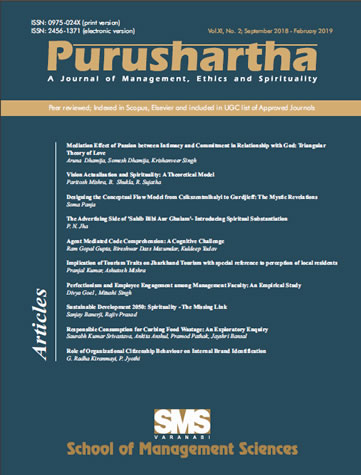 |
||
|
 |
|||||||||||||||||||||||||||||||||||||
| Indexed
in Scopus & Google Scholar; UGC Approved Journal Hosted on OJAS Platform of UGC |
||||
 Numerous
developments have taken place in the field of management in the last
century and the present millennium from the perspective of both theory
and practice. These developments have not only shown its impact on
the economy of nations, technology and business organizations but
also on the world society and human psyche. Whether the impact is
positive or negative is a subject of debate. But one thing that is
apparent is that this field is constantly evolving and more and more
dimensions are added to it by management thinkers on continuous basis.
The field of management is highly practical in nature and that makes
it prone to highest level of scrutiny. Theories are accepted and rejected
on the basis of its practical utility in short term or long term. Numerous
developments have taken place in the field of management in the last
century and the present millennium from the perspective of both theory
and practice. These developments have not only shown its impact on
the economy of nations, technology and business organizations but
also on the world society and human psyche. Whether the impact is
positive or negative is a subject of debate. But one thing that is
apparent is that this field is constantly evolving and more and more
dimensions are added to it by management thinkers on continuous basis.
The field of management is highly practical in nature and that makes
it prone to highest level of scrutiny. Theories are accepted and rejected
on the basis of its practical utility in short term or long term.
If we look back at most of the modern management theories, one inherent fallacy that can easily be observed is that they have been developed with the mindset that profits are more important than the human beings. Profit or any other factor can never supersede the human factor and that is a reality. Ignoring the human factor can never lead to long term survival of not only a management theory but also business organizations and even nations. Modern day economists have based their theories on the assumption that there are limited resources and unlimited human needs. By assuming that human beings have unlimited needs is in one way degrading the human beings. All human beings have limited needs like food, water, clothes and shelter and rest all other things come under desire and not needs. Desires are endless and needs are limited. Control over desires take human beings to the higher level of evolution and pursuance of more and more desires degrade human beings to the animal level. Moreover the nature has given enough resources to fulfill the needs of all human beings but when it comes to desire there always will be scarcity. Mahatama Gandhi had once said that this earth is too big to take care of all human beings but is too small for the greed of people. Now the time has come to come out of the reverse thinking process that prevailed for last so many decades where a myopic view of pursuing self-interest at any cost was the core theme of management and economic thinking process. Fragmentation has to be get away with integration. This whole world is interconnected and the basis of all thinking process should be the holistic development of all the human beings of this earth. Sacrificing element should enter into the thought process rather than the self-interest. Materialistic pleasures have no end and it leads people into vicious circle. Self-management is more important today than managing machines, technology, and business organizations. In ancient Indian wisdom and spirituality, self-management has been given utmost importance because to manage the outside world it is imperative to manage self first. With the above thoughts at the back of the mind, School of Management Sciences has taken a novel initiative to add a new dimension into the management thinking by starting a bi-annual journal ‘Purushartha’. The Journal ‘Purushartha’ has been started with an objective to focus primarily on:
It is strongly felt that there are many unexplored dimensions and fewer researches have been done on the above subjects. Through this journal an effort has been made to explore those dimensions for enriching the modern management science. It is worth mentioning that our effort through this journal for blending ancient Indian wisdom, ethics, values and spirituality with modern management thoughts primarily derived from West is being appreciated by the academia and industry as well. We hope that through the support of all of you we will be able to achieve our objectives. We solicit suggestion and advice from all of you for improving the quality of the journal. Articles/Research paper may be sent at : purushartha@smsvaranasi.com |
||||
Click here for Abstract & Full papers of latest issues:
|
||||
| HOME
| VISION
| OUR PROGRAMMES
| ACTIVITIES
| PUBLICATION
| PRESS COVERAGE
| NEWS &
ANNOUNCEMENT | VEDIO CLIPS
| CONTACT US © Copyright, School of Management Sciences, Varanasi |



